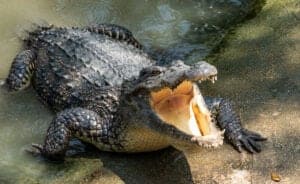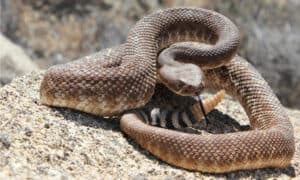There are more than 3,000 species of snakes that live on Earth. Luckily, out of those species, only about 600 of them are venomous, and about 200 able to kill or severely wound people. You may be trying to keep snakes away because you have young children or pets. Or some people simply are afraid of the creatures and don’t want to see them around their houses. Either way, here is a list of 14 smells you can use to help deter the slithering reptiles from your yard and home. While no scent is scientifically proven to repel snakes directly, ultimately, the best way to get rid of them is to get rid of their shelter and prey. With that, the smells of some of the plants listed below might repel these prey.
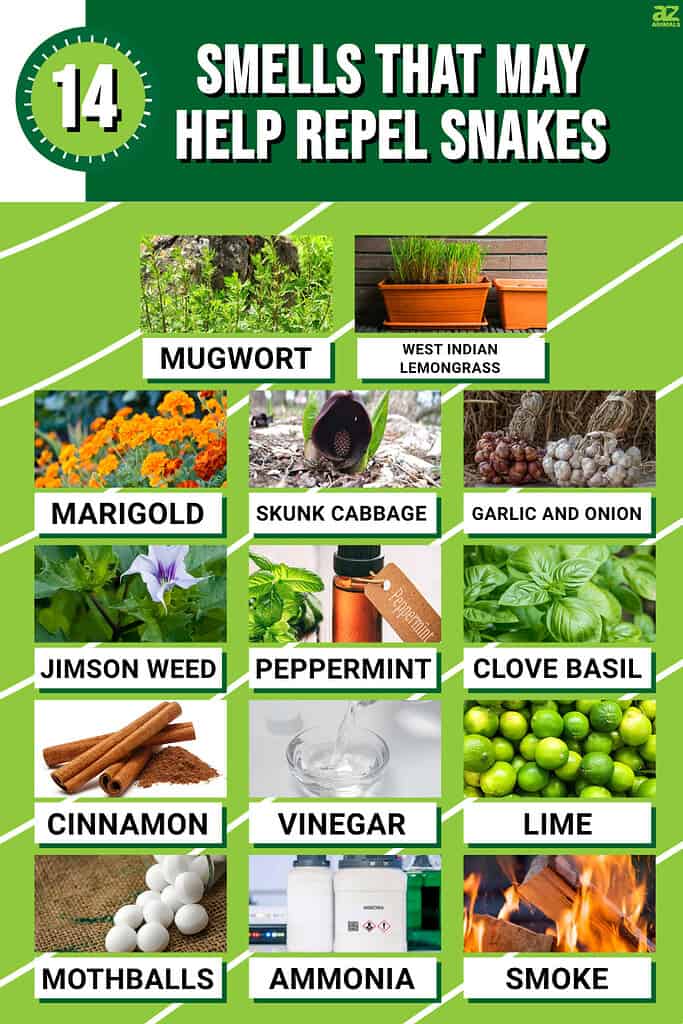
How Do You Stop Snakes?
Snakes have been living on the earth for longer than humans. They are used to being in the wild and roaming freely, so they may not mean to be in your yard or around your home. Most of the time, snakes will take off at the sight or smell of danger. Beyond that, there are quite a few smells that might help drive off their prey, which will in turn help to repel snakes — with one important caveat: There is no definitive proof that any odor repels snakes.
Most of the smells on the list are a type of plant or plant derivative. This is helpful because that means simply planting the plants around your home can keep snakes from approaching. They make for a low-effort, effective way to keep snakes (or their prey, rather) at bay.
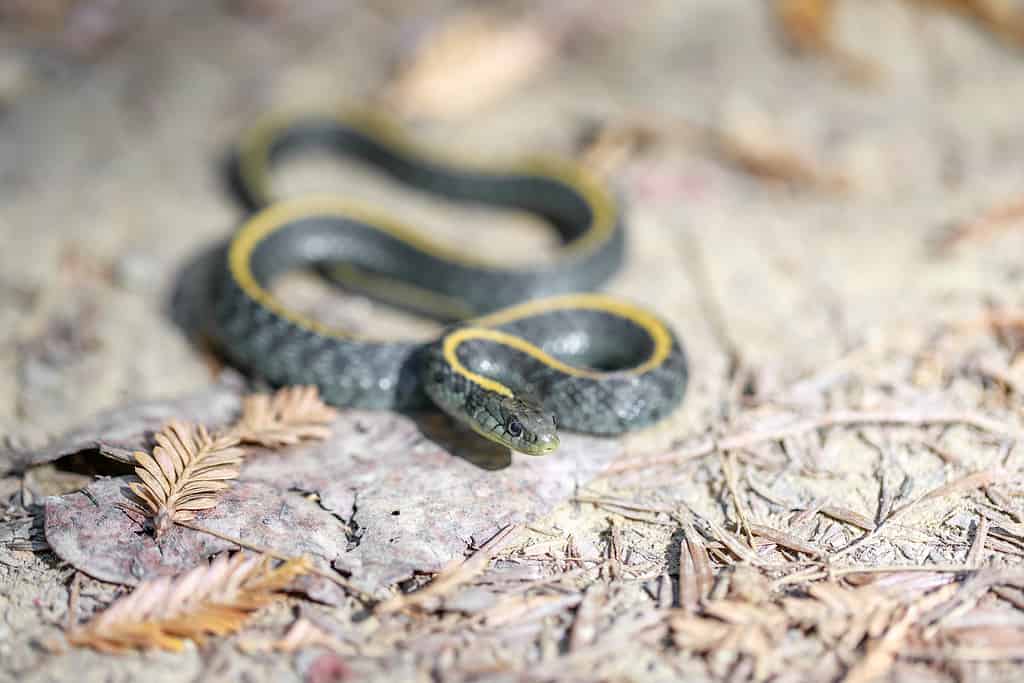
Snakes usually take off at the sight or smell of danger, so using plants to repel them can work wonders for your garden and home.
©yhelfman/Shutterstock.com
Mugwort
Mugwort, also known as wormwood or Chrysanthemum weed can help repel prey animals like mice. It’s a perennial that can survive in most climate conditions, thriving in USDA zones 3 to 9. It has a strong scent and repels prey through smell as well as being a visual repellent. The only downside to growing mugwort is that it can spread quickly and requires close maintenance to keep at bay.
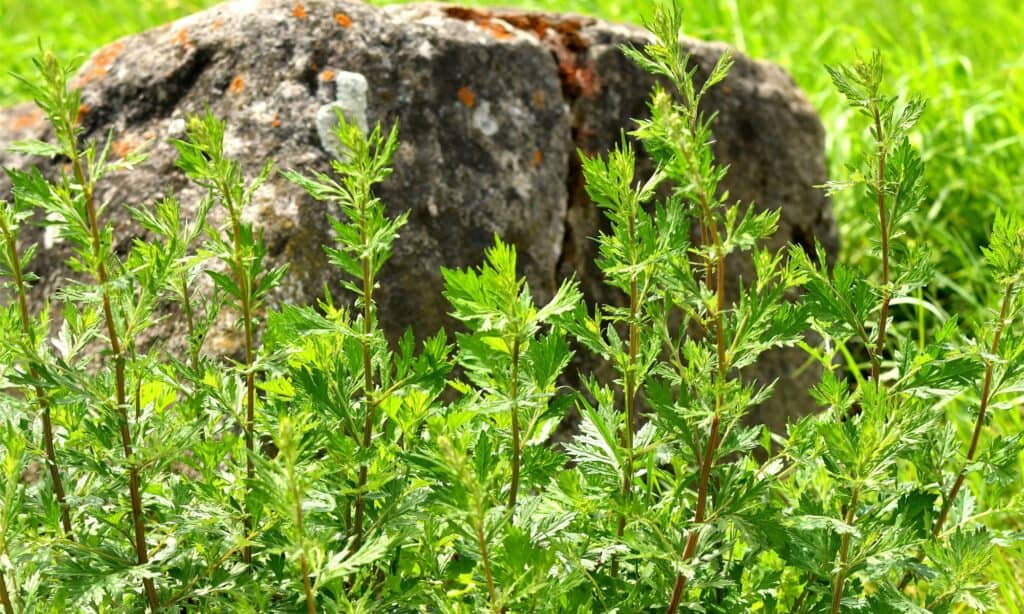
Mugwort reaches up to 6 feet tall and smells repulsive to prey animals.
©iStock.com/HansJoachim
West Indian Lemongrass
Any variety of lemongrass will work, but West Indian lemongrass has been proven most effective as a deterrent to animals that snakes prey upon. It is the same plant that is used in citronella candles, which are effective in repelling mosquitoes and other bugs. The strong, citrusy odor is offensive to snakes and other animals, and the plant can be used for cooking and teas. It’s also a very easy plant to grow because it doesn’t require very much attention, just a bit of water. With so many pros and almost no cons, there’s no reason not to use this plant in your garden.
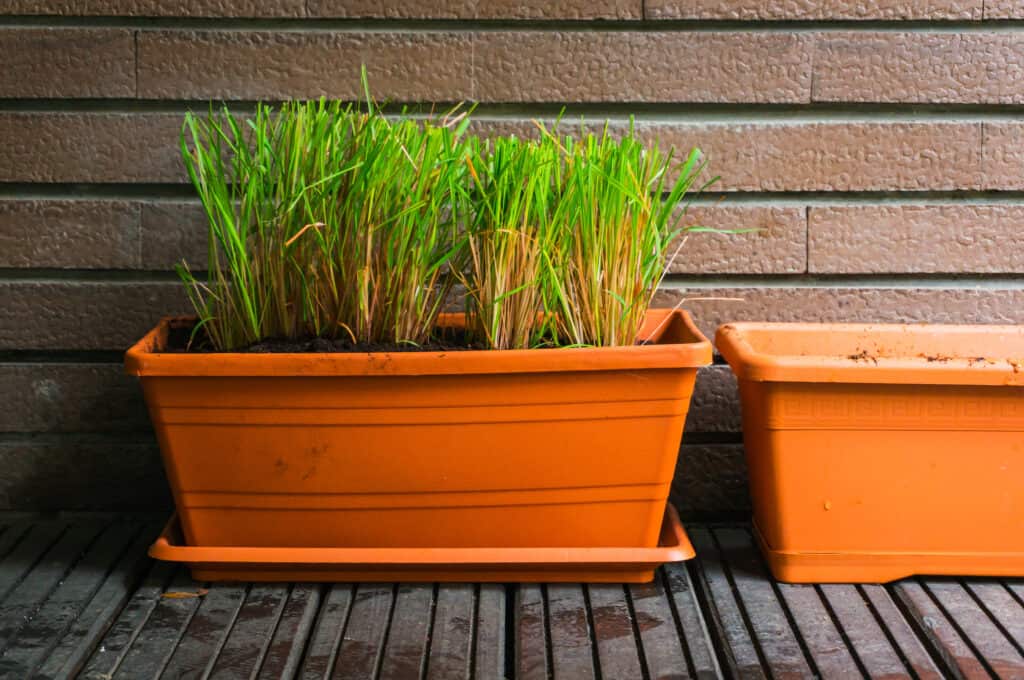
Lemongrass can be planted in gardens or in pots.
©Travel_Master/Shutterstock.com
Marigold
Marigold plants are usually known for their bright yellow-orange flowers, but did you know that they can also help keep prey animals at bay? The strong odor that the plants give off may repel rodents, mosquitoes, tomato worms, snakes, and even rabbits. If you want to keep snakes out of your garden, your best bet is clearing out debris, but plants like marigolds may help repel prey animals with their strong scent. You can also keep a few marigolds in pots by your front door to deter snakes and prey animals from hanging out on your porch.
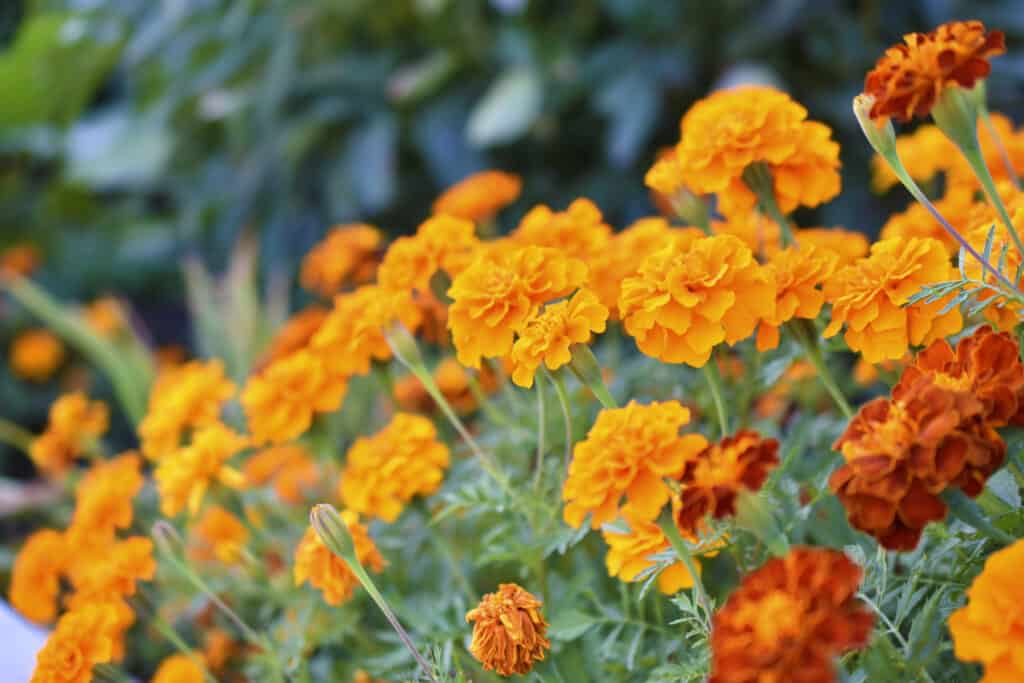
Marigold leaves emit a scent that many animals don’t like.
©iStock.com/Valeriy Lushchikov
Skunk Cabbage
By now, you must have figured out that snakes aren’t deterred by strong-smelling plants, but their prey might be deterred. The skunk cabbage is true to its’ name and does smell like a skunk. Unfortunately, you and your pets may not like the smell of a skunk cabbage either. If you can stand the scent, skunk cabbage is a very beneficial plant that serves many purposes. It’s used to treat worm infections and respiratory diseases, and also as a part of traditions and rituals in many cultures.
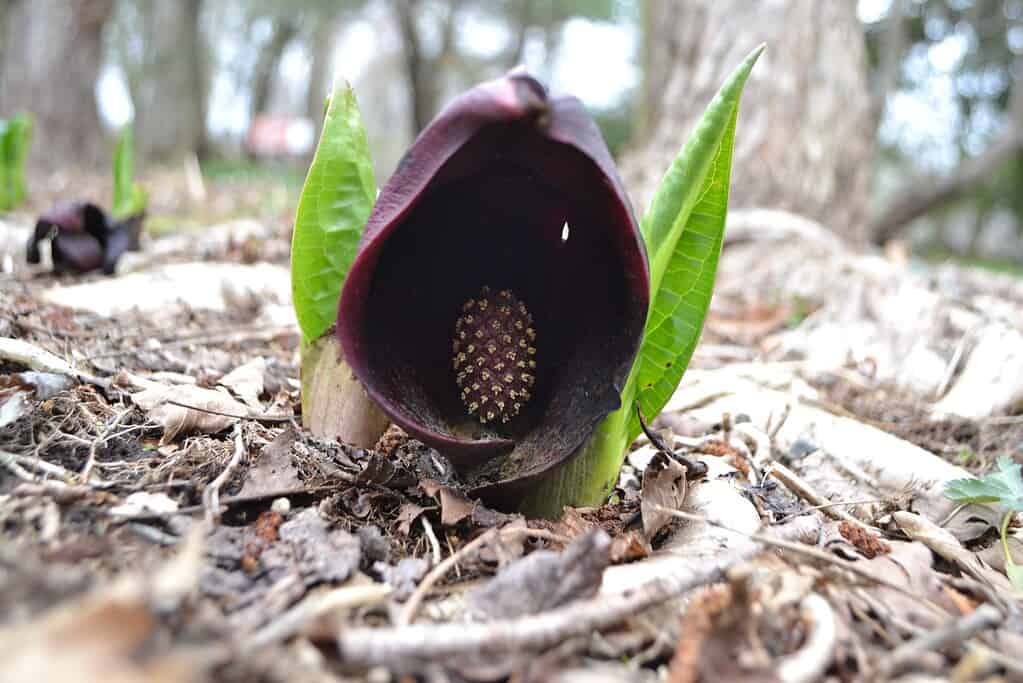
Flowering skunk cabbage smells repulsive to snakes, as well as humans and pets.
©Edita Medeina/Shutterstock.com
Garlic and Onion
Two popular kitchen foods, garlic, and onion, are also excellent prey deterrents because of their overpowering smells. Both of these can be planted throughout your garden or in pots. If you don’t want to grow these plants, you can also use their essential oils or simply buy them from the store. Fresh onions and garlic can be cut up and sprinkled around the areas where you want to deter prey animals and snakes.
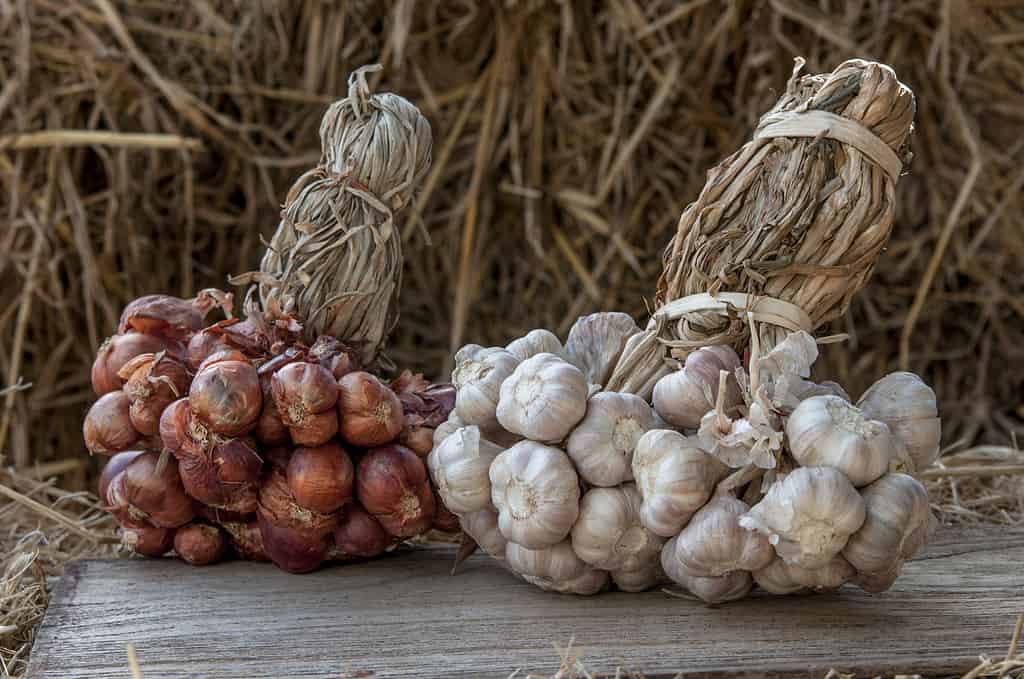
Garlic and onions can be cut up and sprinkled around your home.
©Tongsai/Shutterstock.com
Jimson Weed
Jimson weed works two-fold. The bitter smell is repulsive to prey animals like rodents, but the plant also has sharp leaves that can cut their skin. It is likely not going to be a first choice because the plant is invasive and considered dangerous. Some cultures use the plant for its hallucinogenic properties, but the chemicals that cause the hallucinations can also lead to the death of the user. It only takes a small amount of this plant to become deadly. It’s a plant that should be planted very cautiously.
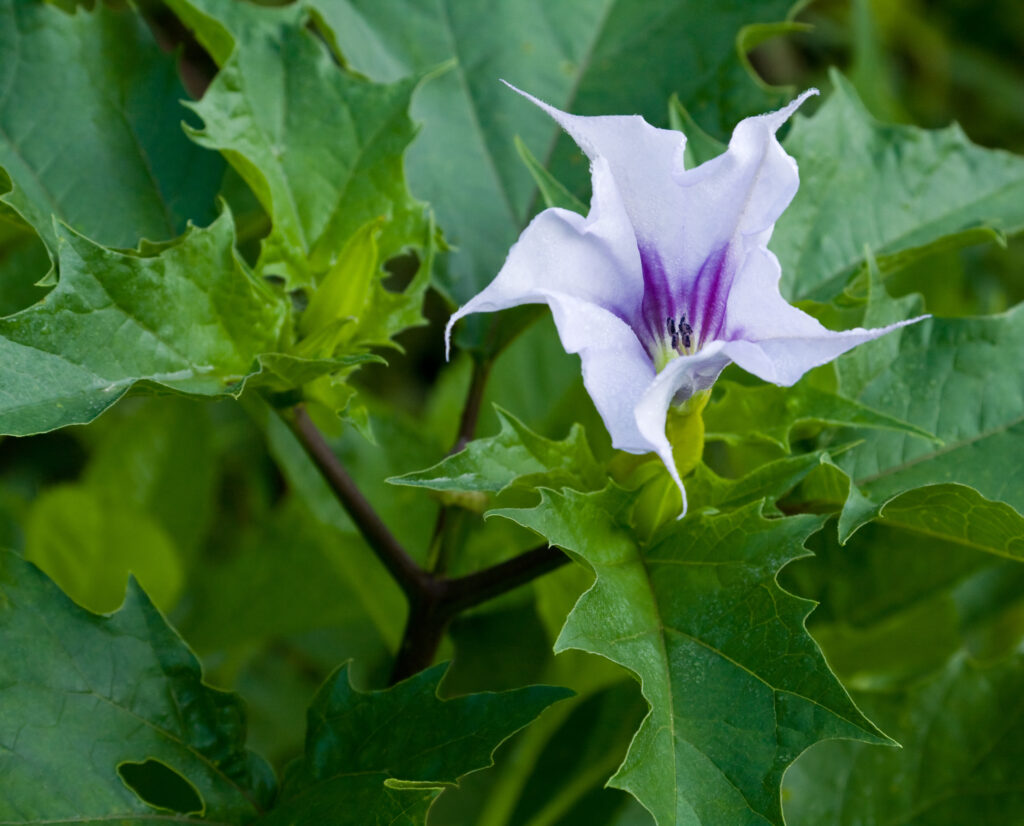
Although death is uncommon, devil’s weed intoxication produces bizarre behaviors, insomnia, nausea, hallucinations, urinary retention, and amnesia. It should be used cautiously if you have pets or young children.
©Melinda Fawver/Shutterstock.com
Peppermint
A safe and effective deterrent for snakes and prey animals is peppermint and other plants in the mint family. Because mint has such a strong smell, small mammals and insects often dislike it and will stay away. Of course, snakes follow their prey, so if you can get rid of that then you can get rid of the snakes. Mint can be planted in the ground or pots. It’s also effective as an essential oil or spray. Spraying mint around your home may help deter multiple pests including mice.
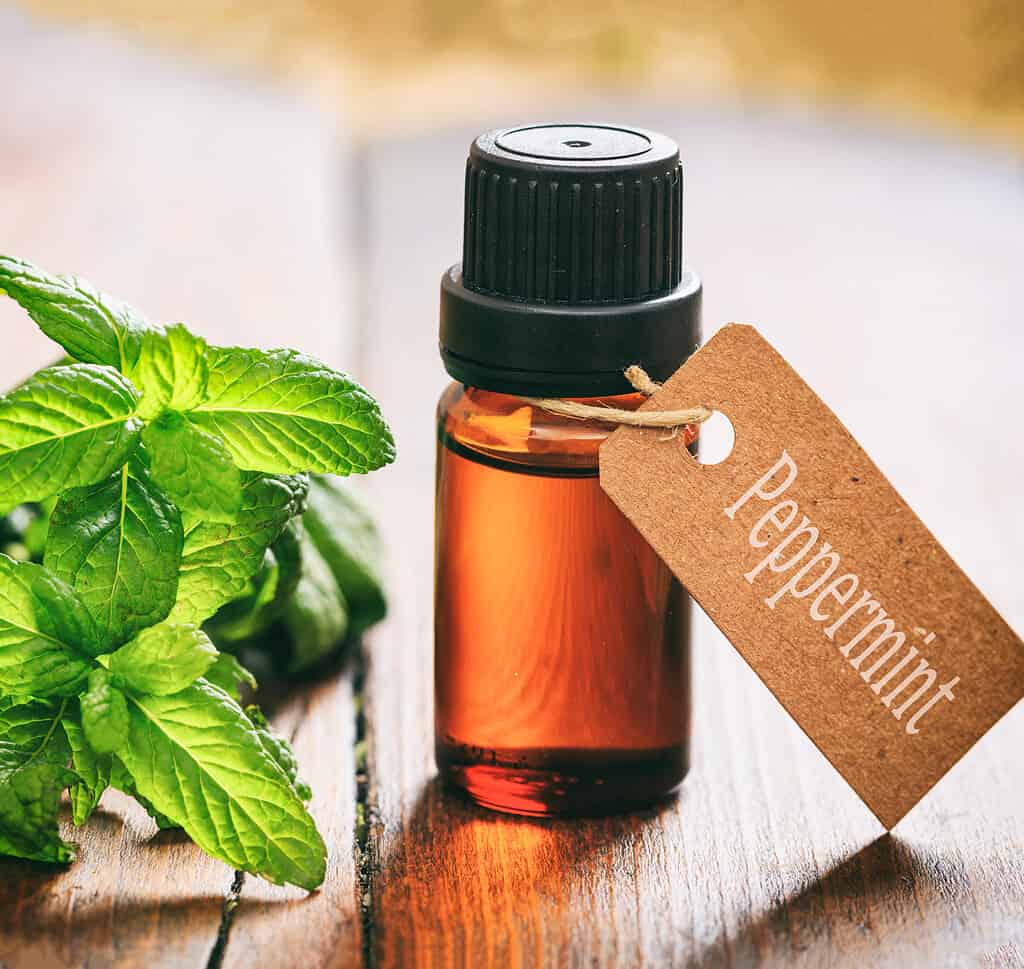
Peppermint essential oil can be sprayed around areas where mice are commonly found.
©iStock.com/Rawf8
Clove Basil
Effective in both its plant and essential oil forms, clove basil can help deter prey animals like mice. It’s one of the most aromatic plants and it has a scent that many animals really don’t like. Luckily, most people don’t mind or even enjoy the smell of clove basil. It’s an edible herb that can also be used in the kitchen, making it both safe and effective.
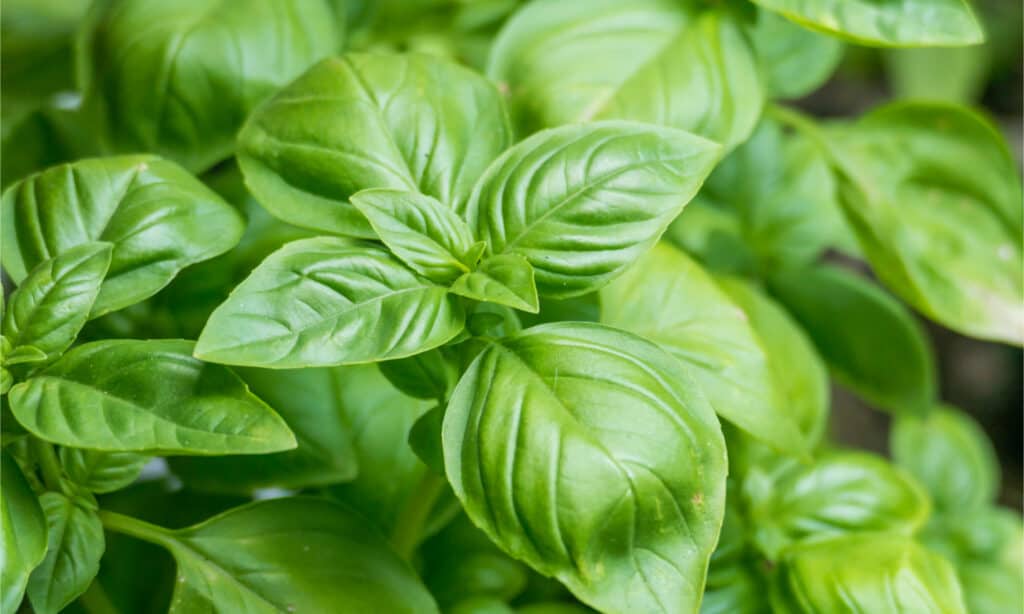
Clove basil, also known as basil, is a strong-smelling plant that is safe for consumption.
©David Jalda/Shutterstock.com
Cinnamon
If you enjoy cooking, or just eating delicious baked goods, you know that the smell of cinnamon overtakes a dish instantly. It only takes a small amount of the spice to smell it, so it’s a great way to fend off prey animals and therefore snakes. Planting a cinnamon tree probably isn’t your best bet, but if you love cinnamon, it’s definitely an option! Sprinkling cinnamon or spraying the essential oil around your home will be much more effective at deterring prey animals.
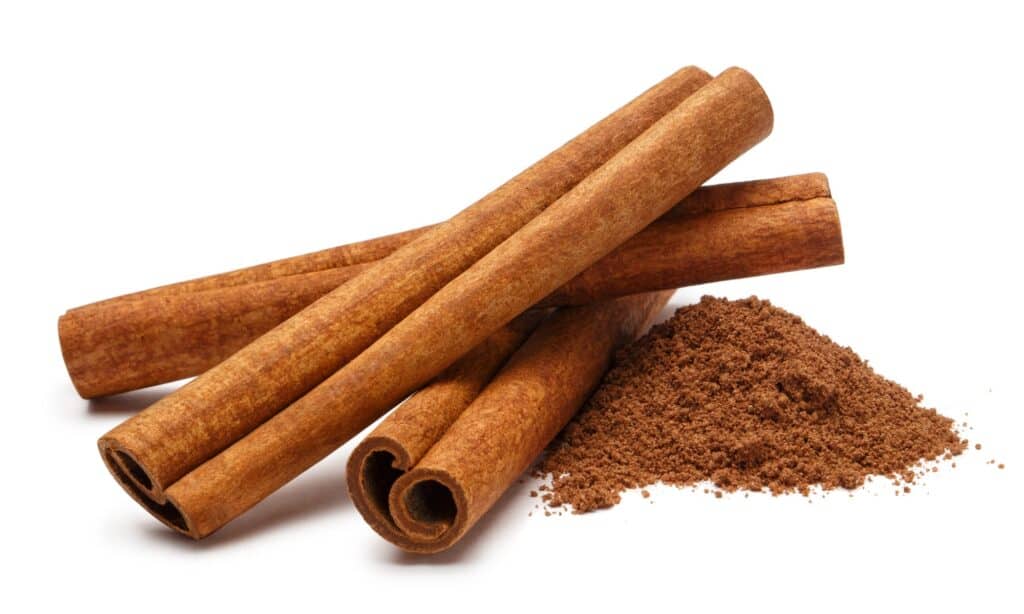
Try sprinkling cinnamon powder in areas where snakes are a problem.
©iStock.com/Marat Musabirov
Vinegar
When you think of strong, offensive smells, vinegar is probably high on your list. For many animals, the acidic content in vinegar is key to being so bothersome. You can try pouring or spraying vinegar on the ground in places rodents regularly visit, or places you don’t want them to venture.

The strong, acidic vinegar smell might keep snakes at bay.
©iStock.com/Michelle Lee Photography
Lime
Like other citrusy scents, small animals seem to dislike the smell of lime. Dry lime powder or lime essential oils can be sprinkled or sprayed around your yard. The smell will deter prey animals from coming around, especially when used together with some of the natural deterrents listed above.
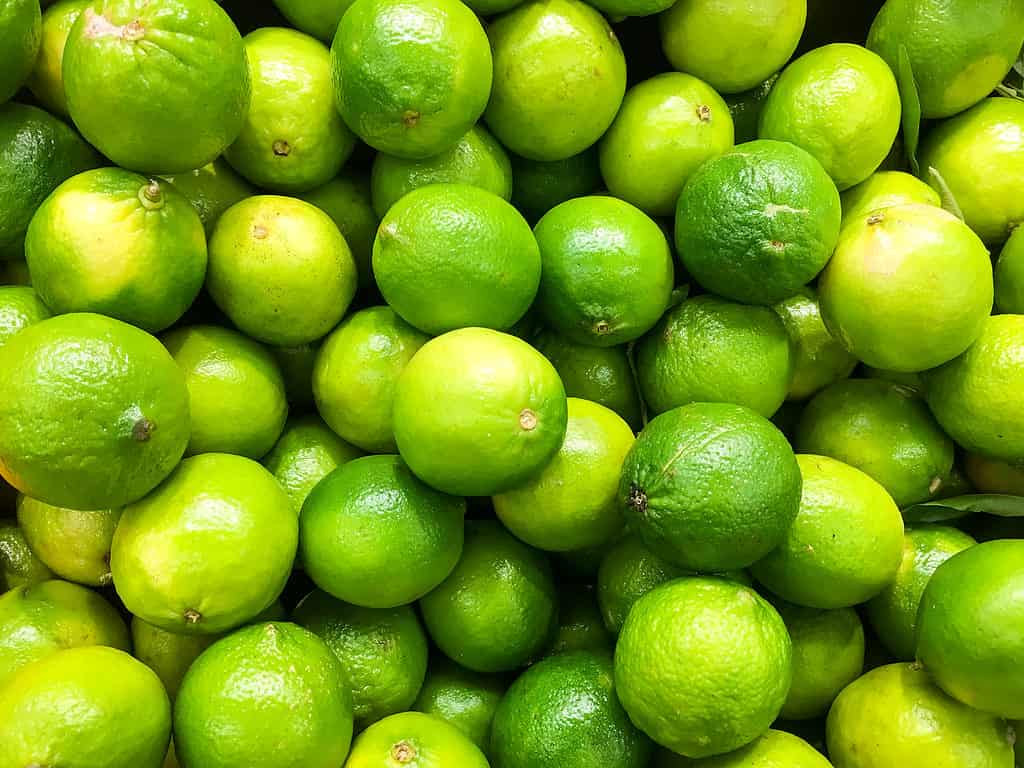
Limes are best used sprinkled in their powder form or sprayed as an essential oil around your home.
©Radu Bercan/Shutterstock.com
Ammonia
Ammonia is a chemical with a strong scent that many animals hate. Gardeners use it as a spray around homes and on rocks to keep unwanted animals from crawling over them. It’s scentless and invisible to humans, but that doesn’t make it safe. Ammonia can kill snakes and other animals that crawl across it. It’s also harmful to humans because breathing in the gas can cause health issues.
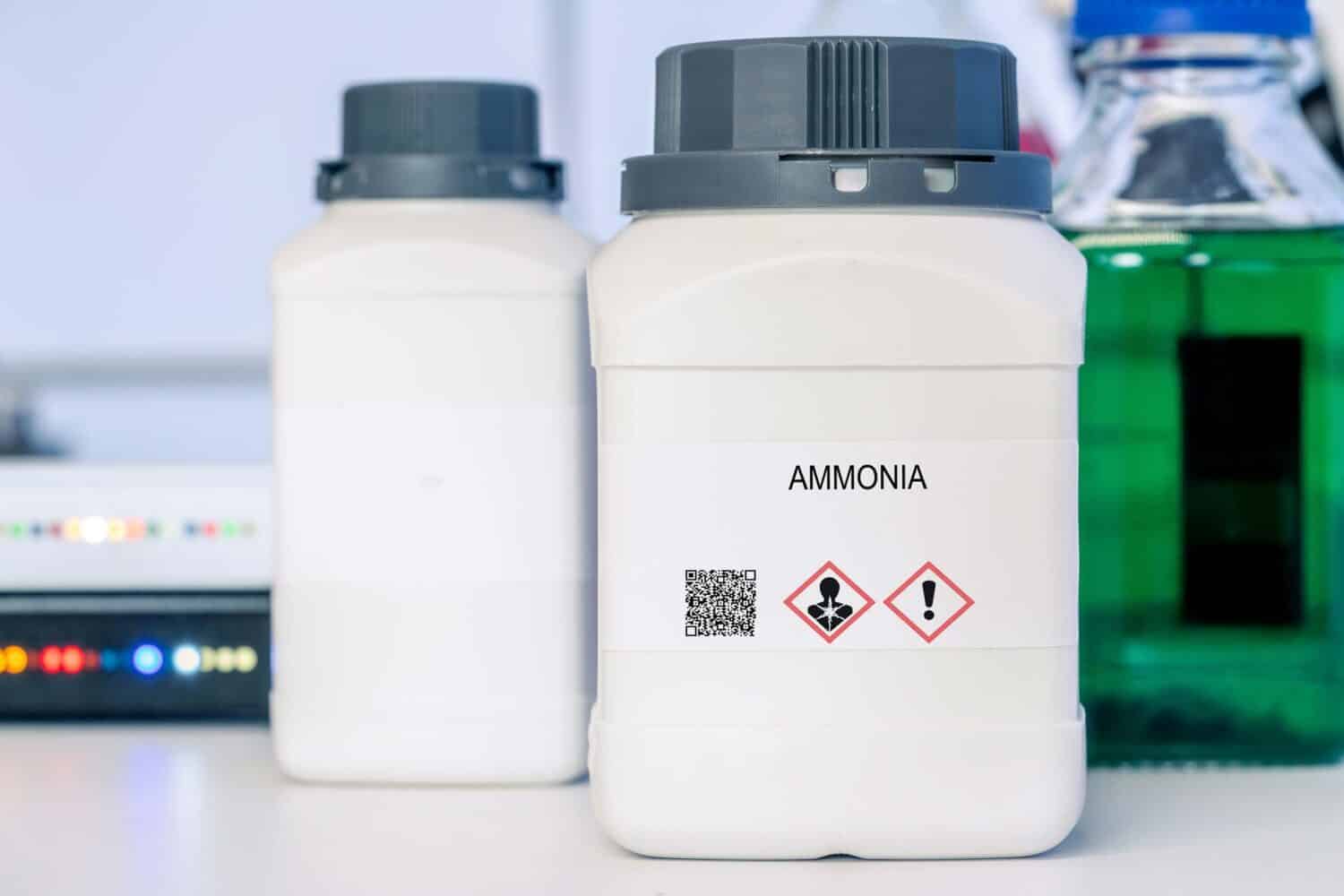
Ammonia might repel prey animals and snakes, but it’s also dangerous for humans to breathe.
©luchschenF/Shutterstock.com
Smoke
While this isn’t a long-term solution to snake problems, smoke does seem to deter snakes and other pests. This is a good thing to keep in mind when camping or spending time outdoors at night. A bonfire can be a welcome way to keep warm and keep the crawling critters away.

Smoke is another smell that snakes hate, and it can drive them out of crevices they may be hiding in.
©iStock.com/Vitelle
Summary For the 14 Smells That May Help Repel Snakes’ Prey
Here are the 14 Smells That May Help Repel Snakes’ Prey:
| Rank | Smells That May Help Repel Snakes’ Prey |
|---|---|
| 1 | Mugwort |
| 2 | West Indian Lemongrass |
| 3 | Marigold |
| 4 | Skunk Cabbage |
| 5 | Garlic and Onion |
| 6 | Jimson Weed |
| 7 | Peppermint |
| 8 | Clove Basil |
| 9 | Cinnamon |
| 10 | Vinegar |
| 11 | Lime |
| 12 | Ammonia |
| 13 | Smoke |
The photo featured at the top of this post is © iStock.com/JWJarrett
Discover the "Monster" Snake 5X Bigger than an Anaconda
Every day A-Z Animals sends out some of the most incredible facts in the world from our free newsletter. Want to discover the 10 most beautiful snakes in the world, a "snake island" where you're never more than 3 feet from danger, or a "monster" snake 5X larger than an anaconda? Then sign up right now and you'll start receiving our daily newsletter absolutely free.
Thank you for reading! Have some feedback for us? Contact the AZ Animals editorial team.



